5 Best Probiotic Foods For Weight Loss
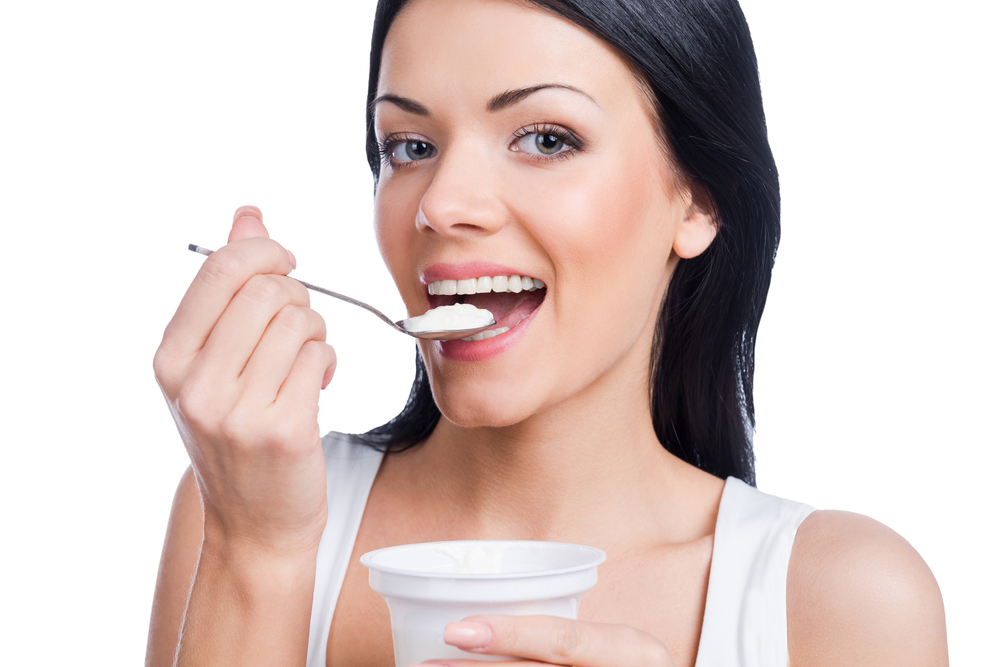
Are you losing weight, or are you losing the battle against weight?
It can be utterly frustrating to see weight pile on, especially if you think you’re doing everything humanly possible.
And it only seems to get harder as you age, but especially past your forties.
Think you’re the only one? Far from it. According to recent stats published by the CDC, in 2014 more than 70% of the adult US population was considered overweight.[1]
So what’s the real problem then? Often times, it’s an aspect of health that you may have overlooked time and time again; your gut health and the friendly residents living there, the probiotic bacteria.
Do probiotics help you lose weight? Many clinical studies have proven they do, and they're undoubtedly worth adding into your diet. Try these 5 best probiotic foods for weight loss and start seeing the difference the right strains of good bacteria can do for you.
1. Sauerkraut
You’ve undoubtedly heard of sauerkraut before, and have probably even had it a few times in your life, but why should you eat more?
Historically, sauerkraut has been a staple part of Central European diets for centuries. Back then, it wasn’t made specifically for its later-to-be discovered benefits on health and weight loss, but rather as a way to simply preserve foods.
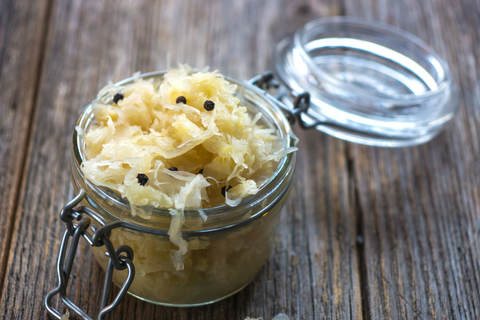
Sauerkraut (a German word meaning “sour cabbage”) is simply cabbage that has been acted upon by natural bacteria and fungi which ferment the sugars in it, producing the beneficial probiotics in the process.
There are many different types of probiotic bacteria that reside in our gut, but some play a much more important part in helping bring about weight loss and preventing weight gain.
When it comes to sauerkraut, Bifidobacterium breve predominates, a probiotic that is found in the tract of babies and adults alike, but in reduced colonies, as we age. The presence of a sufficient colony size of this bacteria can a positive anti-obesity effect on your body
A study conducted on mice found that those administered B.breve displayed enhanced rates of fat metabolism, and improved insulin sensitivity, disruptions to both being associated with increased risk of becoming obese.[2]
So what does this mean for you? How about your body metabolizing food the way it should without handicaps (such as poor glucose absorption, inability to properly use fat). The end result is the enhanced utilization of food you eat.
2. Miso
Miso is a type of soybean seasoning, made via fermentation of cooked soybean with koji; a special grapefruit-smelling fungus that kick starts the fermentation process.
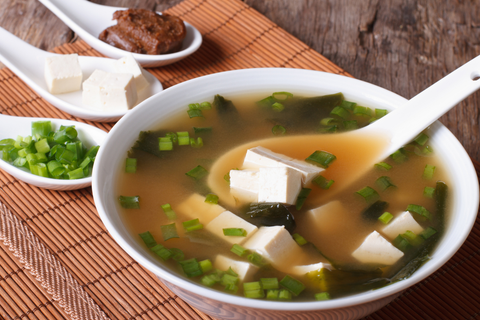
What makes miso so good? The presence of a type of probiotic bacteria known as Lactobacillus gasseri. Though this strain of probiotic isn’t extremely well-known, it can be considered an industry secret by professional weight loss coaches and is one of the better ones for bringing about weight loss.
It first garnered interest in 2010 when a group of obese subjects given a beverage enriched with the probiotic was found to have lost a significant 4.6 percent body fat over the course of 12 weeks.[3] Much of the weight loss appeared to come from the belly area, in turn decreasing the risk of serious metabolic conditions from developing.
Don’t like the taste of miso? It doesn’t take a lot to experience the metabolism boosting effects. Even small amounts of the probiotic culture are good enough to help shred that body fat. Just keep in mind that ensuring you get some of this probiotic in your diet literally translates to weight loss without doing any extra work!
3. Kimchi
This Korean staple consists of vegetables that have been salted and fermented, with cabbages and Korean radishes being commonly used.
Had a type of Kimchi before and didn’t like it? There are literally dozens upon dozens of flavors that exist based on the vegetable used, so finding one that you love is all but guaranteed.

Kimchi has been analyzed and found to contain over 100 different strains of probableprobiotics, though most notably the presence of Lactobacillus gasseri is what you should be interested in for weight loss.
This probiotic is the same one found in miso that is responsible for its excellent effects on weight loss, but the unique trait of L.gasseri is its ability to target belly fat. As you may not necessarily be obese, but rather overweight with a high proportion of fat around the midsection, it makes sense to consume foods with this strain of probiotic.
4. Yogurt
While yogurt is a known probiotic food, you may not understand the role it can play in weight loss, as it is not often discussed.
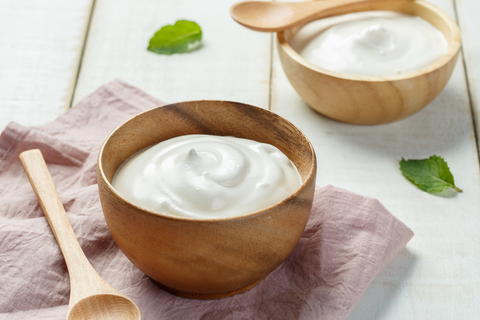
However, while the aforementioned foods help actively promote weight loss, yogurt, on the other hand, does its hard work in the shadows, helping decrease the likelihood of you gaining weight.
Yogurt and many other fermented milk products are good sources of the probiotic strain Bifidobacterium lactis, found heavily throughout the intestines.
Studies conducted on obese mice have found that even when administered a hyper caloric, high-fat diet, the rate of weight gain was significantly reduced, along with improvements to glucose tolerance and kidney function, traits that are disrupted following the development of metabolic disease.
But that’s far from all this versatile probiotic does, as studies have found that it can favorably improve your cholesterol ratio,[4] decreasing levels of LDL and helping raise HDL values.[5]
5. Kefir
Kefir is another common fermented milk product that differs from yogurt in its consistency and in the method of production since both bacteria and fungi are involved in the fermentation process.
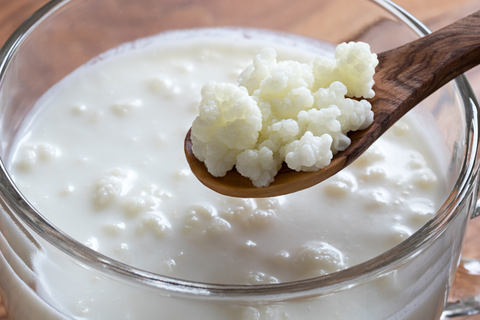
Better known as “kefir milk”, kefir itself is actually the starter (substance that kick starts the fermentation process) product, found growing in the Caucasus Mountains in Europe.
Kefir milk beverages contain the probiotic culture Bifidobacterium lactis as well, similarly to yogurt, which helps to prevent excessive weight gain.[6]
When combined with another probiotic culture lactobacillus rhamnosus, it is also effective in bringing about weight loss, in conjunction with preventing re-gaining of the weight.[7]
B.lactis also produces short-chain fatty acids from breaking down of dietary fiber, these fatty acids being important sources of energy for cells living in the colon. In turn, a greater anti-inflammatory action is elicited, which could offset metabolic slowdown and prevent subsequent weight gain.
Challenging To Consume All Probiotic Foods?
If you’ve tried diet and exercise religiously and are yet to see meaningful weight loss, the missing piece of the puzzle is likely your probiotic colonies. Yes, you certainly have millions of them living in you right now, but they are probably not the strains you need for weight loss, or you have too much of the “bad bacteria” which overshadow their potential.
So what comes next? Increasing your intake of the specific probiotic strains mentioned above, by consuming more fermented foods such as kimchi, miso, yogurt, and sauerkraut. But I know what you’re probably thinking “it will be hard to consume those things every day”, which is a sentiment millions of people share. Consuming the right probiotic foods for weight loss can be a chore.
A far more practical solution is to consume a probiotic supplement containing scientifically proven strains that help with weight loss. Not just a random assortment of probiotics in the interest of looking impressive.
We at Better Body Co. have formulated a 3-strain probiotics for weight loss called Provitalize. Our users have reported to lose as much as 5 pounds within a week, even without any major change in their diet or lifestyle.
References:
1. https://www.cdc.gov/nchs/fastats/obesity-overweight.htm 2. https://www.jstage.jst.go.jp/article/bbb/74/8/74_100267/_pdf
3. https://www.ncbi.nlm.nih.gov/pubmed/20216555
4. https://www.ncbi.nlm.nih.gov/pubmed/12209372
5. https://www.nature.com/articles/1601399
6. https://www.ncbi.nlm.nih.gov/pmc/articles/PMC4274436/
7. https://www.ncbi.nlm.nih.gov/pubmed/23886977

